Key takeaways:
- Understanding writing contests involves balancing adherence to guidelines with showcasing your authentic voice.
- Choosing the right contest aligns your unique style with the expectations of judges, enhancing your chances of success.
- Preparing submissions requires careful attention to guidelines, thorough editing, and seeking feedback to improve your work.
- Embracing feedback as a valuable resource, along with reflecting on contest outcomes, fosters growth and deepens writing skills.
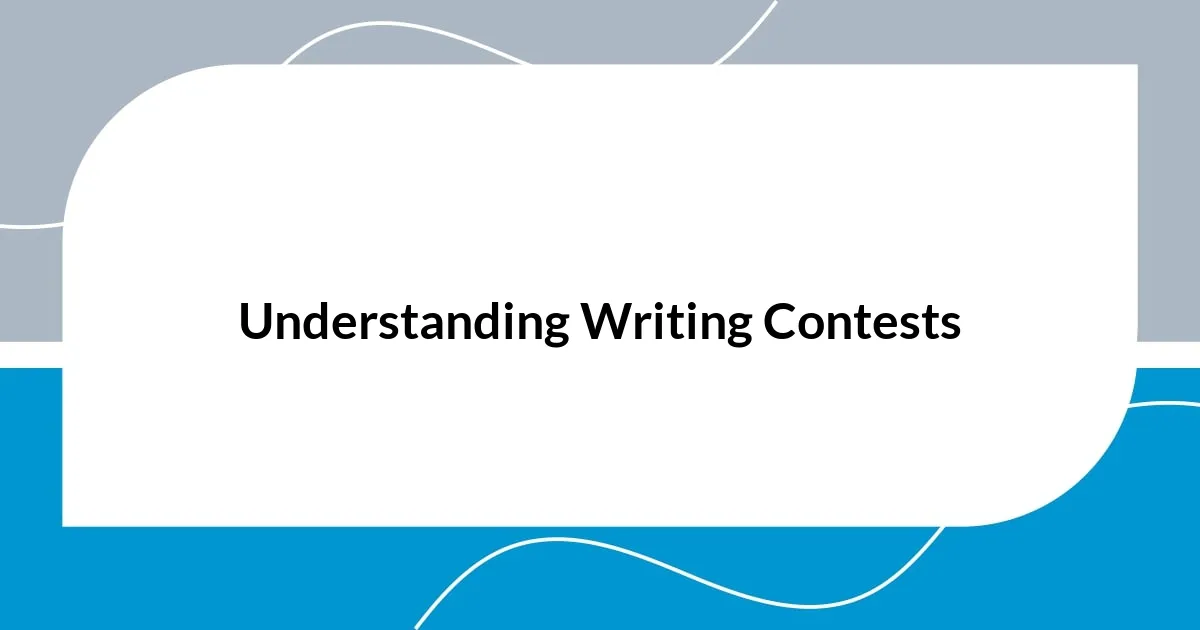
Understanding Writing Contests
Writing contests are a unique space where your creativity can shine, but they also come with their own set of rules and expectations. I remember the first contest I entered; I was filled with excitement but also a bit of dread. How do you balance showcasing your voice while adhering to the contest guidelines? It’s a delicate dance, and each contest has different criteria that can affect your approach.
While some contests focus on genre or theme, others might have strict word limits or stylistic requirements. I once found myself agonizing over a 500-word piece, repeatedly cutting and reshaping it to fit the requirements. This experience taught me the importance of being flexible and not losing my voice in the process. Have you ever felt lost trying to meet someone else’s expectations? It’s a common struggle for many writers, but it can also lead to profound growth.
Ultimately, understanding the intricacies of writing contests involves more than just recognizing the rules; it’s about tapping into your authentic voice while being strategic. I’ve learned that the best submissions often come from a place of honesty and passion. So, the next time you’re staring at that blank page before a contest deadline, ask yourself: what story do you truly want to tell? The answer might just be your winning ticket.
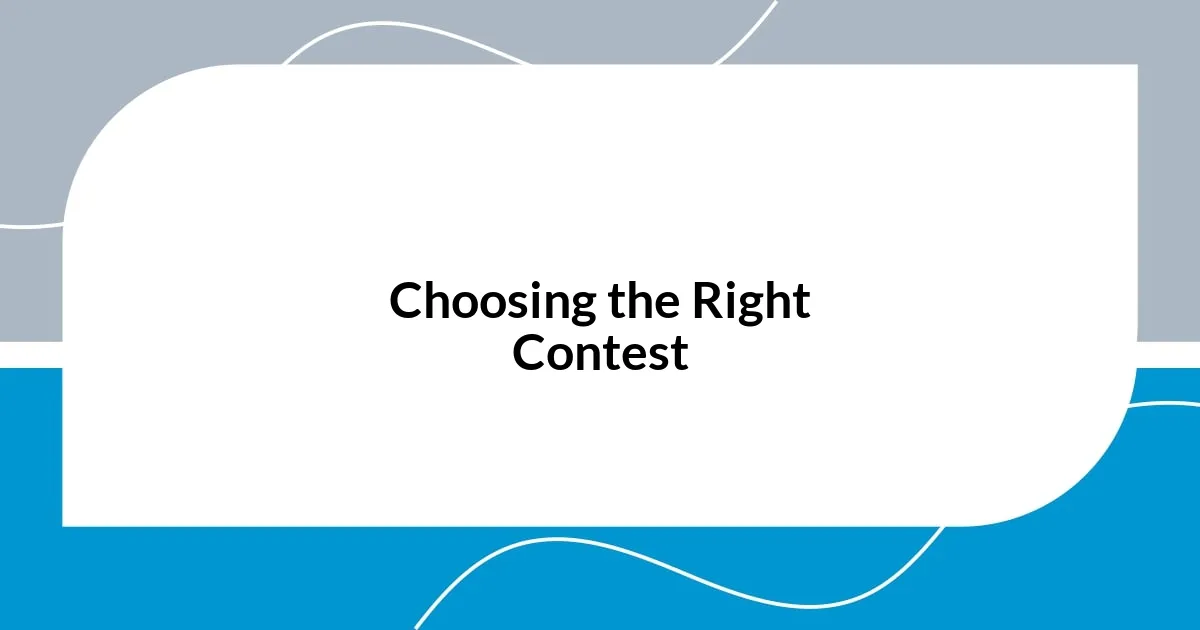
Choosing the Right Contest
Choosing the right writing contest can feel overwhelming, especially with so many options available. When I first started, I remember getting swept up in the excitement of contests that promised fame and publication. However, not every contest is a good fit for every writer. It’s crucial to align your unique style with a contest that appreciates it.
I had a moment of clarity when I chose to enter a contest focused on personal narratives. It reminded me of my own experiences, and I felt confident that my voice would resonate with the judges. That sense of connection can make all the difference. Have you ever noticed that when you write about something you’re passionate about, your work seems to flow more easily? It’s that personal investment that can elevate your submission.
Before you commit to a contest, consider reviewing past winners and their pieces. This little exercise not only provides insight into what judges appreciate but also helps you gauge whether your writing style matches what they typically reward. I remember gleaning so much from reading previous submissions; it saved me countless hours of writing and revising. Finding the right contest really can be a strategic choice that enhances your chances of success.
| Contest Type | Considerations |
|---|---|
| Genre-based | Focus on your strengths within a specific genre. |
| Theme-based | Reflect your personal experiences that align with the theme. |
| Word Limit | Practice brevity while maintaining your voice. |
| Judging Criteria | Investigate what past winners submitted. |
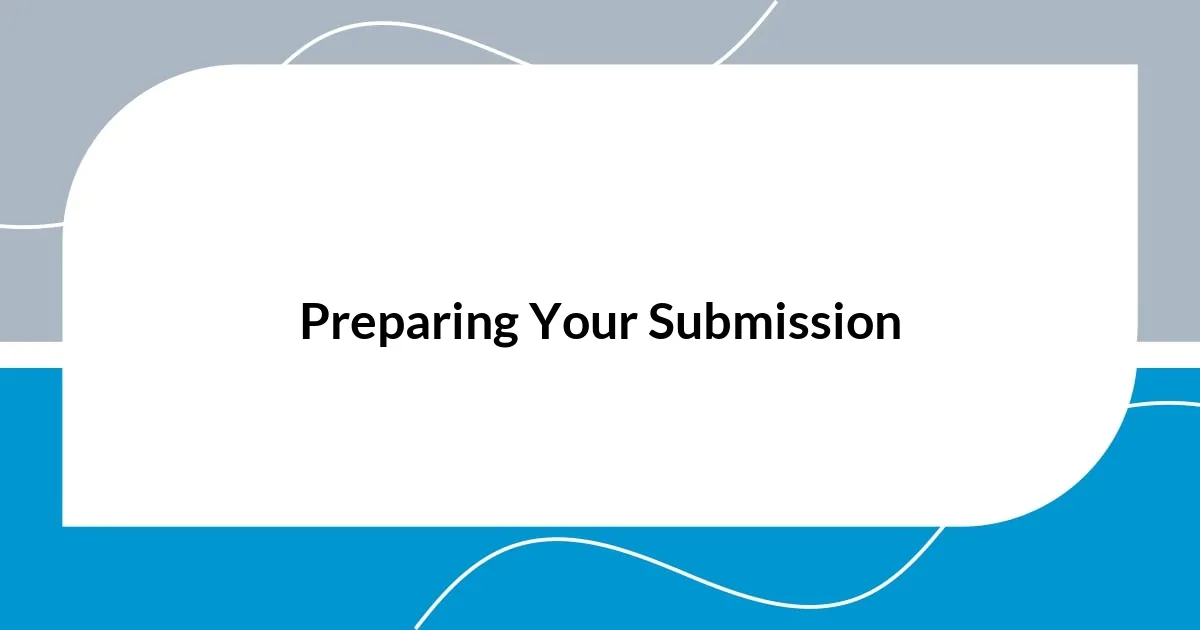
Preparing Your Submission
Preparing your submission can feel like an uphill battle, but I assure you, it’s all part of the process. I’ve found that taking the time to carefully read the guidelines not only helps me avoid disqualification but also shapes my approach to the writing itself. One particularly stressful submission demanded a specific format that I initially found daunting. Just when I thought my creativity was being stifled, I realized that the structure actually provided me with a framework to enhance my storytelling.
As I worked on that piece, I learned to embrace the format rather than resist it. Here are some tips that can help you prepare effectively:
- Read the Guidelines Thoroughly: Never skip this step. Each contest has unique requirements.
- Edit Ruthlessly: I can’t tell you how many times I’ve had to cut entire paragraphs. Focus on clarity and impact.
- Seek Feedback: Share your drafts with trusted peers or mentors to get fresh perspectives.
- Format Carefully: Pay attention to the submission format; it can be a simple requirement that makes a big difference.
- Follow Deadlines: I remember almost missing a deadline once; plan ahead to avoid last-minute errors.
Every step towards preparing your submission is about fine-tuning both your craft and your presentation. When I finally clicked “submit,” my heart raced, but I felt proud knowing I had invested time and thought into my work. That moment is crucial—take it seriously and make it count.

Tips for Crafting Winning Entries
Crafting a winning entry is a blend of creativity and strategy, something I’ve learned over the years. One crucial tip I’ve found is to start with a strong hook. In my early submissions, I often overlooked the opening lines, but those first few sentences can make or break your chance of grabbing a judge’s attention. Have you ever read something that instantly drew you in? That’s the power of a compelling introduction, and it sets the tone for everything that follows.
Another aspect I always emphasize is authenticity. Authenticity resonates; when I poured my genuine feelings into a piece about a tough life lesson, the judges responded positively. They could feel my passion, and it showed me that vulnerability can be a strength in storytelling. It really makes me wonder: how often do we hold back when sharing our experiences? Opening up can connect you with readers and judges alike, creating a bridge through your words.
Lastly, I always recommend closing with a thoughtful punch. I remember a contest where my ending didn’t just wrap things up neatly; it left the judges reflecting on my piece long after they had read it. A strong conclusion can linger in a reader’s mind, prompting them to revisit your work. So, think about what final message you want to convey. What lasting impression do you want to make? In the realm of writing contests, crafting an unforgettable entry is about engaging the heart as much as the mind.
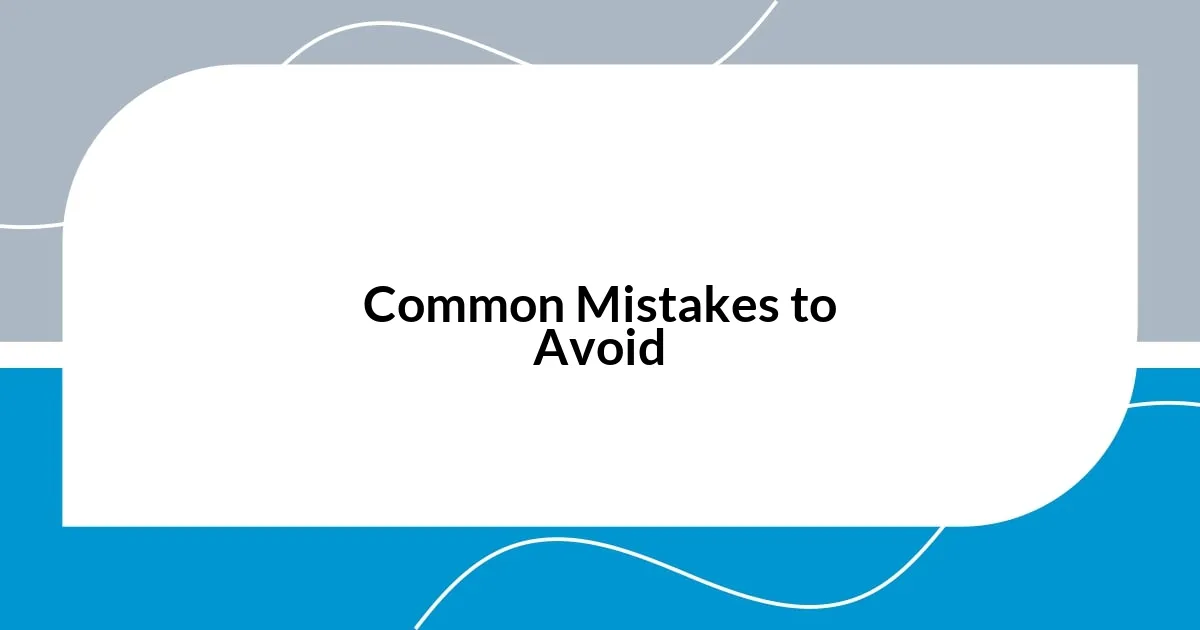
Common Mistakes to Avoid
One common mistake I see many writers make is losing sight of their unique voice while trying to fit a mold. In my earlier contests, I adjusted my style to what I thought judges wanted, which often left my entries sounding generic. Have you ever read something that felt completely flat, lacking the spark that makes a piece truly shine? That’s usually what happens when we compromise our authenticity. Embracing your individuality is essential; it’s what sets your work apart from the competition.
Another pitfall is neglecting to proofread. I’ll never forget a contest where I submitted a piece that had a glaring typo right in the title. My heart sank when I received feedback. The judges liked the content, but the error made it seem careless. It makes you wonder—what can you do to ensure attention to detail? I’ve found that reading your work out loud helps catch those sneaky mistakes you might miss when reading silently. It’s a simple practice that can elevate the professionalism of your submission.
Finally, submitting last-minute is a recipe for disaster. I remember a time I was so caught up in perfecting my piece that I left submission until the very end. I felt a wave of panic wash over me when my internet connection faltered at the worst possible moment! My advice? Create a buffer between final edits and the deadline. This cushion allows for a calm review and ensures that you can submit your best work without the added pressure of time constraints. How do you want to feel when hitting “submit”? Trust me, a little planning goes a long way in alleviating stress.
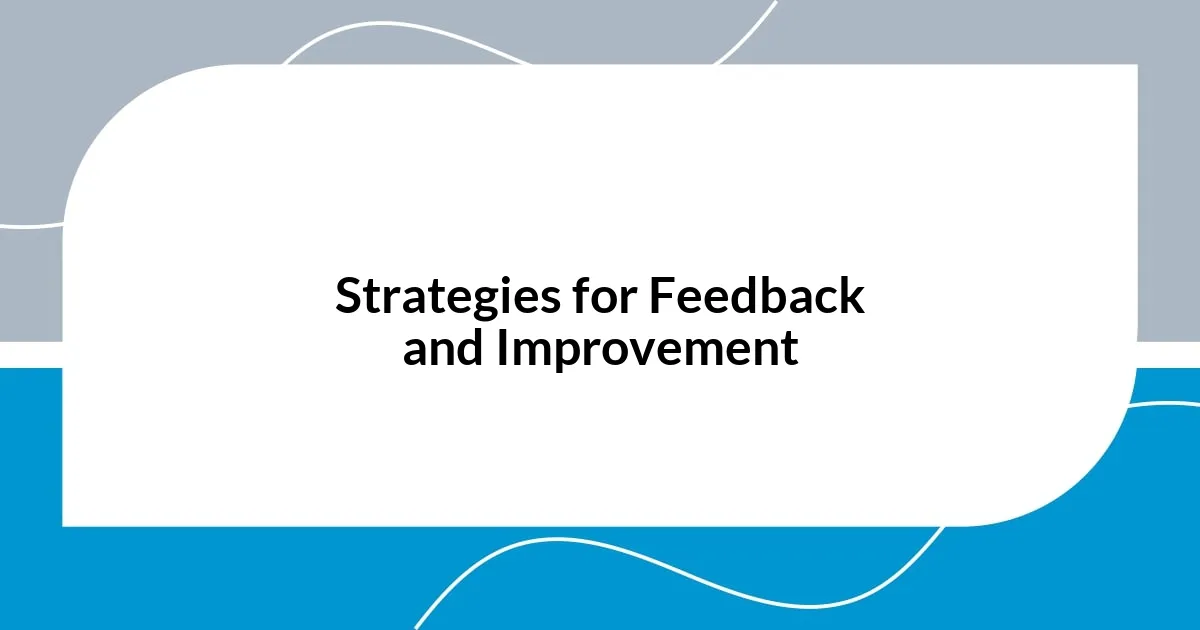
Strategies for Feedback and Improvement
Feedback can feel daunting, but it’s a vital part of the writing process. I vividly recall a moment when I shared my entry with a trusted friend. Their constructive criticism opened my eyes to aspects I hadn’t considered, like pacing and character development. Have you ever received feedback that shifted your perspective entirely? Embracing external insights can transform your work and deepen your understanding of your strengths and weaknesses.
When it comes to incorporating feedback, I suggest keeping a journal for reflections. After each contest, I jot down feedback I receive, regardless of how it feels in the moment. Early on, I found it easy to dismiss negative comments, but I learned that they often point to areas for growth. How often do we overlook this valuable resource? By revisiting those notes, I can track my evolution as a writer and identify recurring themes in the feedback, which has been instrumental in honing my craft over time.
To truly enhance your writing, consider joining a critique group. In my experience, having a supportive community makes the feedback process much less intimidating. I remember my first meeting with fellow writers, where we exchanged perspectives in a safe space. Each member brought unique insights that challenged my thinking and deepened my creativity. What could a fresh set of eyes reveal about your work? Collaborating with others fosters a sense of accountability and encourages a spirit of innovation that often leads to exciting breakthroughs.
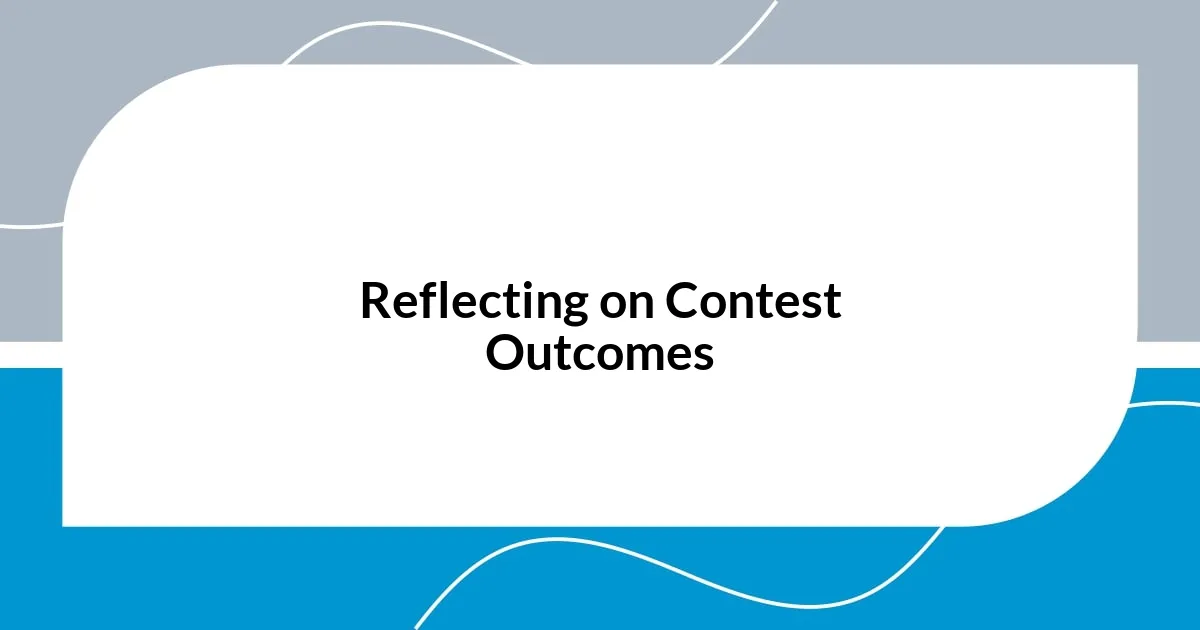
Reflecting on Contest Outcomes
Reflecting on the outcomes of writing contests can feel like a rollercoaster ride. I remember receiving feedback that praised my story’s emotional depth, but it was the critique about pacing that stung a bit. Have you ever felt a mix of pride and disappointment reflecting on your work? Understanding that both positive and negative feedback contribute to growth is essential; it’s all part of the learning curve we navigate as writers.
After my most recent contest, I took some time to review the feedback, and it struck me how pivotal those insights are. One judge noted that my characters felt real, while another pointed out a plot hole that left me scratching my head. This duality made me realize that every piece of feedback is a stepping stone in developing my craft. How often do we overlook the value of such rich critiques in shaping our narratives? I now embrace criticism, as it often reveals blind spots I never knew existed.
I also learned that comparing outcomes across different contests can be enlightening. After a disheartening experience with one competition, I entered another and ended up as a finalist! I couldn’t help but think about what changed in my approach. Did I tap more into my authentic voice this time around? By reflecting on these varied outcomes, I gain clarity about my growth trajectory and what resonates with both me and my audience. It’s fascinating how each contest brings a new layer of understanding, isn’t it?